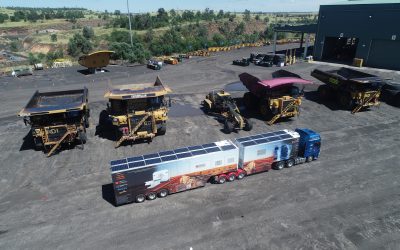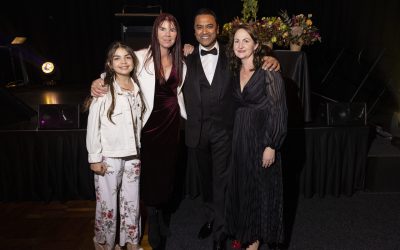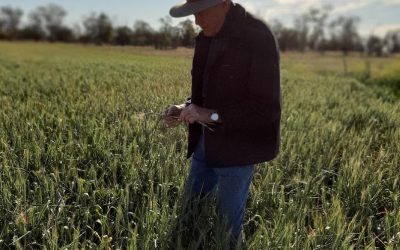John Teunis captivated the audience at this year’s Gala Dinner with his frank and compelling message: “if it weren’t for Heart of Australia, I’d be dead.”
John was cleaning the gutters of his home in St George when he started to experience chest pain as he repeatedly climbed up and down the ladder.
“Initially I didn’t tell anyone. I just kept on going to get the job done. But the pain increased. I eventually told my wife, and she immediately took me to the hospital. After an initial test, the doctor turned to me and said ‘you’ve got a problem’.
John had undergone surgery to implant a heart stent 15 years earlier, but the challenges associated with travelling to Brisbane meant it had been many years since he’d had it checked.
John had recently been experiencing increasing tiredness and was now experiencing chest pain and breathlessness. Still, as he had not yet had a heart attack, he was not eligible for emergency transport to Brisbane for immediate treatment.
“It was a terrible predicament. We’d caught it in time before I had a heart attack, but because I hadn’t had a heart attack yet, I didn’t quality for urgent treatment. The doctors could send me to Brisbane once I’d broken down, but they couldn’t send me in straight away for the preventative maintenance that would prevent me from having the heart attack. They put me on a waitlist and said it would likely be months before I would get an initial appointment.
“I had a family history of fatal heart attacks. My father and my two brothers all died from heart attacks, so I was pretty confident that if I waited until I had a heart attack, it would kill me. But I had no choice.”
“Lucky for me, my GP knew the Heart of Australia truck was coming to town the following week. She wrote me a referral and the Heart Of Australia bookings team found me a priority appointment.”
“Dr Gomes had me step onto the treadmill for the cardio stress test. It lasted about two seconds before I needed to stop. I then had an ultrasound, right there on the truck, before Dr Gomes looked at me and said ‘we need to get you in quickly. If you wait for a heart attack, this could be all over red rover.”
“I let him know I’d been told it would be months before I made it to the top of the list. He made some calls and got me an initial appointment in Brisbane within two weeks.
“Some people can safely wait those months, but I couldn’t, and Dr Gomes knew it. I’ve come to believe that when you’re one guy in the outback with no cardiologist to advocate for you, you are just another job on a list of thousands. But when a top cardiologist calls and says that you have to go to the top of the queue – they have clout.
Securing John an appointment at the hospital in Brisbane was just one of the hurdles he would face. As people living in rural Queensland will tell you, there are many challenges involved in accessing specialist healthcare.
“I was too unwell to drive to Brisbane, so I needed to find someone to drive me. My wife had been unwell, but she was our best option. And I needed to find and book accommodation in Brisbane near the hospital.”
“There is some travel allowance available through Queensland Health, but there’s a whole lot of paperwork and you can’t access it until months after you’ve paid for it. And you still have to have the money upfront. Luckily I had a small amount of savings which I could use to do it, or else I wouldn’t have been able to go.”
Once in Brisbane, John’s hospital tests revealed he had 98% blockages in four major arteries.
“They said I probably should have been dead, and that stents wouldn’t fix it. I was in big trouble, and I’d need surgery. I could barely walk, I was struggling to breathe, and I’d spent the last two weeks in and out of the local hospital in St George, but because I hadn’t had a heart attack yet, I didn’t qualify for immediate surgery. They needed to send me home, with medication and put me on the waiting list. They said I was a Priority 1 patient, but it would be 3-4 months before I would have surgery. They told me I needed to stay close to the hospital until then, which didn’t make me feel very confident.”
Concerned about a potential heart attack, but with no other options available, John and his wife made the drive home to St George.
John returned to the Heart Truck, which visits St George every fortnight, to update Dr Gomes regarding his test results.
“Rolf looked at me and said, ‘You’re a walking timebomb.’ But he told me not to worry and started making more calls on my behalf. After just a few calls I was booked in to have the surgery two weeks later.”
“That next two weeks was a very scary time. I could hardly breathe, and I was in and out of the hospital. There were other complications, including a gallbladder infection that delayed the surgery another two weeks, but then it was done.
John’s surgery was a success, and he’s never felt better.
“I feel like a young bloke again. I didn’t know how seriously unwell I was until the pain was gone and I could walk and breathe again. And that’s all thanks to the heart truck. I would not have survived the waiting times. The bottom line is I would not be here without them.”
“And they didn’t just help me get the surgery sooner. Instead of needing to travel to Brisbane for all my checkups, I just needed to visit the heart truck. For every scheduled checkup that’s the difference between driving to Brisbane, arranging and paying for time off and accommodation, and just driving ten minutes into St George. It’s taken all the stress out of it.
John recovered well and was able to return to his work as a chaplain and pastoral care worker within twelve weeks. He immediately put his newfound knowledge and experience to work to help his community.
“Talking to the bushies is a major part of my pastoral care work. I travel out to check in with them on farms and properties, just to keep tabs on how they are doing and to lend a friendly ear. The first thing I did when I returned to work was to start talking to them about their health.”
“Being a bushie, people will often put their health concerns last. There’s a ‘suck it up princess’ mentality. A lot of the time, especially since the drought, people can’t afford to hire people to look after their properties, or to take time off from work to travel to the city. It’s a logistical nightmare they can’t afford so they just push through it and hope for the best.
John has now made it part of his mission to pay it forward and help the locals prioritise their health and access the specialist services they deserve.
“I find myself out on properties, standing in paddocks or sitting on tractors and talking to people about their health – and I can speak from personal experience. Before Heart of Australia came to town, it was virtually impossible to just down tools and take off to Brisbane for a week for a checkup. But now that the heart buses roll into town every couple of weeks, there’s no excuse not to get checked out.



